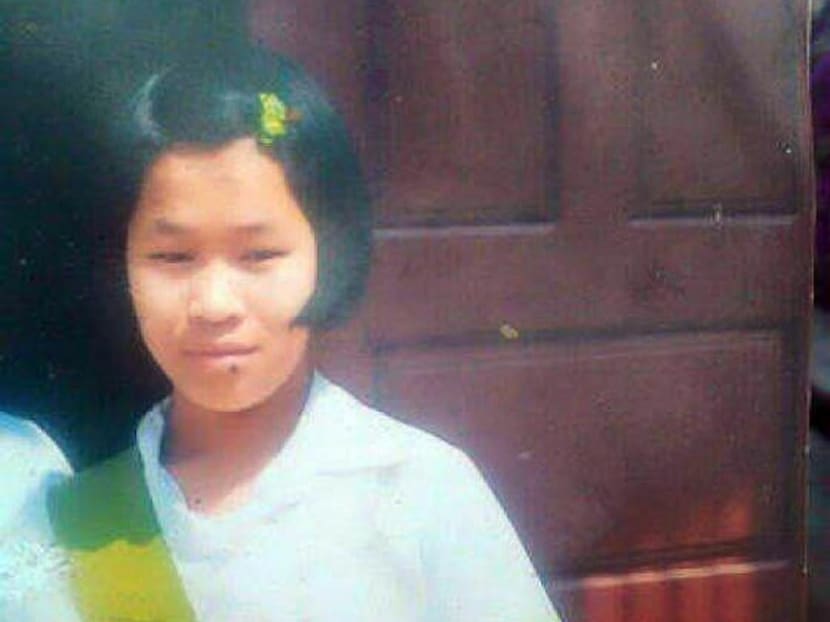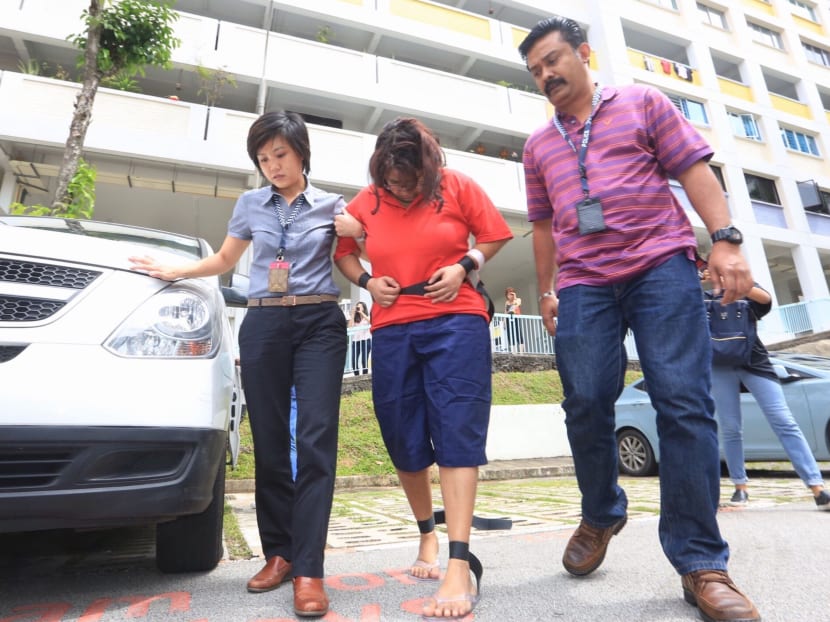30 years’ jail for woman who killed maid by starving, abusing her almost daily for 9 months
SINGAPORE — A 41-year-old woman, who viciously abused her domestic worker almost daily over nine months and starved her till she died in 2016, was jailed for 30 years on Tuesday (June 22).
- Gaiyathiri Murugayan, 40, admitted to various acts of abuse that killed 24-year-old Piang Ngaih Don in 2016
- Prosecutors sought the maximum sentence of life imprisonment
- Her new lawyer asked for eight to nine years’ jail instead on account of her mental disorders
- Justice See Kee Oon called it one of the worst cases of culpable homicide that has come before the courts
SINGAPORE — A 41-year-old woman, who viciously abused her domestic worker almost daily over nine months and starved her till she died in 2016, was jailed for 30 years on Tuesday (June 22).
Gaiyaithiri Murugayan had “abused, humiliated, tortured and starved” 24-year-old Myanmarese Piang Ngaih Don who was “completely vulnerable and utterly defenceless”, in what was undoubtedly one of the worst cases of culpable homicide that has come before the courts, Justice See Kee Oon said during sentencing in the High Court.
The prosecution — led by Deputy Public Prosecutor Mohamed Faizal Mohamed Abdul Kadir — had maintained its argument for the maximum sentence of life imprisonment, calling the case especially heinous and horrific to warrant it.
Gaiyathiri’s murder charge had been reduced to culpable homicide not amounting to murder. This was due to her mental disorders, including major depressive disorder, having substantially contributed to her committing the offences.
The Singaporean pleaded guilty in February to 28 offences. Justice See took into consideration another 87 similar charges, stemming from acts of abuse committed over two months, for sentencing.
Her lawyer Joseph Chen told TODAY that her family member has asked him to file an appeal against the sentence.
LAWYER SOUGHT 8 TO 9 YEARS’ JAIL
Following her plea of guilt, Gaiyathiri discharged her previous lawyers.
In April, her new defence counsel, Mr Chen, asked the court to impose a gag order prohibiting further reporting on the case in order to protect her children from adverse media publicity, as well as a reduction of the sentence.
On Tuesday, Mr Chen abandoned his argument for Gaiyathiri’s culpable homicide charge to be reduced and asked for eight to nine years’ jail instead, on account of multiple factors such as Gaiyathiri not having abused her first four domestic workers.
Gaiyathiri, he claimed, turned into an abuser a few months after giving birth to her second child when she started to suffer from postnatal depression and obsessive compulsive personality disorder.
Gaiyathiri took issue with Piang’s poor hygiene practices, which she believed caused her children to fall ill, Mr Chen said.
He added: “Currently, she is back to her previous self of not being a maid abuser. And what I understand is, after she is sentenced, she would need medical help and therapy.”
In response, Mr Faizal, who is a senior counsel and deputy chief prosecutor at the Attorney-General's Chambers, said that these points had already been raised by her previous lawyers or were irrelevant to sentencing.
He noted that some instances of Gaiyathiri’s abuse, such as using a hot iron on Piang, had nothing to do with hygiene.
“She has not shown any remorse. She continues making easy attacks on the domestic worker by laying blame on her even when no such blame can be accorded,” the prosecutor told the court.
"Violence is a function of how she saw the deceased as a lesser human being.”

NO LIFE IMPRISONMENT DUE TO MENTAL DISORDERS
In his brief sentencing remarks, Justice See said that the statement of facts and video clips of the abuse, retrieved from closed-circuit television cameras that Gaiyathiri had installed in the flat, told a “shocking story”.
“(Piang) was made to endure agonising physical and psychological harm for a prolonged duration before succumbing to her injuries. The prosecution’s submissions are framed in forcefully emotive terms but words cannot adequately describe the abject cruelty of her appalling conduct,” the judge added.
Justice See said that he would have had “little hesitation” in imposing life imprisonment if not for her mental disorders, which were a relevant sentencing consideration.
The offence of culpable homicide can attract life imprisonment or up to 20 years’ jail, based on the Penal Code provisions that were in force at the time of her offences.
While the prosecution had argued that the “extreme circumstances” of the case overrode her psychiatric conditions, Justice See said that the court could not ignore the latter.
Gaiyathiri is also apparently responsive to psychiatric treatment and was not deemed to be at risk of re-offending or being a danger to the public, which sets the case apart from other culpable homicide cases where life imprisonment was imposed, the judge noted.
He said, though, that her claims of remorse must be viewed in the context of her actions on the morning Piang died, when she showed “absolutely no remorse”.
Gaiyathiri had lied to police officers, saying that she found the worker lying on the kitchen floor that morning and had not called an ambulance as Piang’s condition was not serious.
The mitigating force of her psychiatric conditions was also not substantial or compelling enough to warrant less than 20 years’ jail for the culpable homicide charge, the judge said.
“The sentence must signal clearly societal outrage and abhorrence of these offences. Although I am not persuaded that she is deserving of life imprisonment for culpable homicide, an extended custodial sentence is neither crushing nor disproportionate to the gravity of her offences.”
The judge similarly found no justification or legal basis to impose a gag order and told the court that public or media interest in the case also does not constitute a valid reason for such an order or for a lighter sentence.
THE CASE
While Gaiyathiri admitted to abusing Piang over a longer period, closed-circuit television cameras that she had installed kept footage for only 35 days.
Investigators had to just rely on footage from June 21 to July 26 in 2016. These video clips showed several instances of the abuse including Gaiyathiri dragging Piang by the hair.
Gaiyathiri was constantly angry with Piang for perceived unhygienic practices and slowness, physically and verbally abusing the younger woman and depriving her of food and water.
Piang lost 15kg and weighed just 24kg when she died in the family’s three-bedroom flat along Bishan Street 11 on July 26, 2016.
Gaiyathiri’s verbal abuse of Piang escalated to physical abuse from October 2015 onwards.
She would assault the worker almost every day, either alone or allegedly with her mother Prema S Naraynasamy, and often several times a day.
On the day Piang died, she had been beaten after Gaiyathiri grew angry that she was too slow in doing the laundry. Piang was then tied to a window grille for several hours.
An autopsy uncovered 31 recent scars and 47 external injuries all over Piang’s body.
Gaiyathiri’s husband, suspended police staff sergeant Kevin Chelvam, 42, and Prema, 61, also respectively face five and 49 charges in relation to the abuse. Their cases are before the courts.












